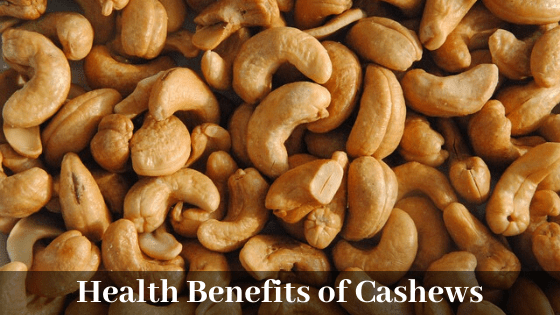Everything You Need to Know About Health Benefits of Cashews
A healthy diet that contains rich food items with high nutritional value provide the body with the essential minerals, vitamins and other nutrients needed for protection against disease as well as for maintaining a healthy body weight. Cashews are rich in heart-healthy monounsaturated fats. These include oleic and palmitoleic acids which are essential fatty acids linked with higher levels of healthy cholesterol (HDL) and lower levels of unhealthy cholesterol (LDL). Because of these attributes, consuming monounsaturated fats found in cashews is typically associated with decreased cardiovascular disease risk.
Contents
All You Need to Know About the Cashews
Originally, cashews were native to Brazil’s coastal north-eastern areas. They are uniquely kidney-shaped seeds that are widely cultivated in areas that present tropical climates. They are typically grown and heavily consumed in countries such as India, Sri Lanka, Tanzania and Kenya. The leading commercial producers of these nutrient-rich seeds are Brazil, India, Nigeria, Mozambique, and Tanzania.
Technically cashews not nuts but seeds from the evergreen tree known as Anacardium occidental native to Brazil. You will find them at the bottom of the fruit, also known as a cashew apple. The benefits of cashews are highly appreciated in Brazil and many parts of Africa and Asia.
Cashews are known for their salty, buttery, and sweet taste plus their unmistakable shape. These nuts are a rich source of important minerals and vitamins. They grow on the cashew nut trees that thrive in subtropical climates. Often, unsalted, raw cashews used in many vegan recipes, and are common in Indian cooking. However, most of us normally eat cashews after these nuts have been roasted and well-salted as a delicious snack.
Benefits of Cashews; Nutrition Value
Every ounce of cashews (16-18 nuts, typically contains 5gms of protein, 160 calories, and 13 grams of fat (largely in the form of heart-healthy monounsaturated fats). Essentially, this makes cashews less calorie dense compared to other nuts like macadamia nuts that carry 200 calories yet just 2gms of protein per every ounce. Eating cashews is thus an excellent snack option for those seeking high-protein or a low-calorie diet.
A cashews serving of 100g contains the following values.
-
-
- Nutrient Value
- Water [g] 5.2
- Energy [kcal] 553
- Energy [kJ] 2314
- Protein [g] 18.22
- Total lipid (fat) [g] 43.85
- Ash [g] 2.54
- Carbohydrate,
by difference [g] 30.19 - Fiber, total dietary [g] 3.3
- Sugars, total including
NLEA [g] 5.91 - Sucrose [g] 5.81
- Glucose (dextrose) [g] 0.05
- Fructose [g] 0.05
-
Benefits of Cashews
Usually, manufacturers sell cashew nuts in their shelled state although part of the nutshell have a resin that’s generally not safe for daily consumption. It is possible, however, to buy raw or roasted cashews seasoned with diverse various flavourings. Such nuts can be used as a snack or as additions to smoothies, salads, stir-fries and other types of meals. With each cashews serving you are harnessing incredible health benefits that makes cashews different from other types of nuts.
1. Rich in Nutrients
Cashew milk contains proteins, healthy fats, as well as a broad range of minerals and vitamins. Most of this fat that you get from this highly nutritious beverage is from unsaturated fatty acids known to that boost heart health plus several other benefits.
Like all nuts, these ones are also excellent sources of protein, one of the 3 macronutrients used by your body for energy. Protein is particularly essential for muscle tissue rebuilding and developing new cellular compounds. In addition, consuming adequate amounts of protein prevents you from pangs of hungry between normal meals, which is helpful when you want to stick to a healthy dietary plan. While most nuts are excellent sources of protein, cashew nuts are particularly useful due to their well-balanced and rich nutritional profile.
2. Boosts Immune System
Cashews are not only rich in copper known to help in iron metabolism and red blood cells formation but also helps in keeping your bones and the immune system healthy. This is also essential for the proper functioning of your nervous and skeletal systems. A copper deficiency in the body could lead to osteoporosis, anaemia, and irregular heartbeats. In addition to high amounts of copper, these nuts are also a great zinc source.
Source of inadequate amounts of zinc compromises the functioning of the body’s immune system as this mineral is vital for its development of system cells and the production of the regulators of antioxidant enzymes. Boosting the intake of zinc is associated with a more robust immune response, something that cashews could assist your body.
3. Source of Dietary Fibers

Cashew nuts contain a great proportion of dietary fibres. Two vital dietary fibres needed by the human body are palmitic and oleic acids. However, our bodies don’t produce these two fibers hence we must consume them externally. Cashew nuts are excellent sources of these two essential fibers.
Generally, dietary fibers help us in digesting our food better, however, their excessive consumption might trigger bloating and intestinal gas production. Enter cashew nuts; they are known to help decrease incidences of digestive diseases.
4. Good for Bone Health
We all know that calcium is essential for the development of strong bones, but did you also know that is magnesium is also critical healthy bones? Approximately two-thirds of the total magnesium in our body is located in the bones. Some of these magnesium aids in giving our bones their physical structure. The rest of it is found on the bone surface where it gets stored for your body to use or draw upon as the need arises.
5. Relaxes Nerves and Muscles
Cashews contain magnesium, known to prevent calcium in your body from over-activating your nerve cells, thus keeping them relaxed. This action will keep your muscles and blood vessels also relaxed. When your levels of magnesium are low, muscle cramps are more often. Fatty acids are useful in the formation as well as the functioning of your body’s myelin sheaths of neurons. Because cashews have fatty acids they may aid with that function too.
6. Good for Eye Health

We’ve all properly heard that carrots are awesome for our eyes, but it may surprise you to know that cashews are good too. Cashews contain lutein and zeaxanthin, important antioxidants. It’s a fact that Xanthophylls like lutein and zeaxanthin significantly boost macular pigment, increase chromatic contrast as well as boost photo stress recovery time.
Regularly consuming cashews may help to keep your eyes health-protecting them from damage that leads to blindness as people age as well as reducing the risk of getting cataracts.
7. Skin and Hair Health

Cashews have copper which is useful in manufacturing various enzymes that are involved in the formation of haemoglobin and collagen. The main structural protein that gives your hair and skin elasticity is found in cashews because they contain copper.
8. Aids Weight Management
Some data would seem to suggest routinely consuming nut is associated with a higher expenditure in terms of energy used while resting. For weight, management this could have implications.
A2004 study found that women reporting eating nuts rarely had greater weight gain incidence of over an 8-year period compared to women who had eaten cashews two or more times weekly. Another study reviews done in 2017 concluded that consuming nuts may assist in maintaining a healthy weight by helping you feel full. It also contributes to thermogenesis, the production of body heat which may help in boosting metabolism.
9. Help Prevent Gallstones
One study covering 80,000 women over a 2 decade period indicated that women who consumed at least 1 ounce of nuts or peanut butter weekly have a 25% lower risk of gallstones developing. Since 1 ounce amounts to just 28.6 nuts or (2 spoons of nut butter), preventing the development of gallbladder may be as simple as picking one cashew butter for lunch daily each week. Even easier, it’s like eating a handful of nutrient-rich cashews as a simple afternoon pick me up snack, or just tossing a couple of cashews on your salad or oatmeal.
10. May Aid Blood Clotting
Cashew milk is recognized for its richness in vitamin K, vital for blood clotting. When your body doesn’t get ample amounts of vitamin K, it can lead to excessive bleeding. Although deficiency of vitamin K in healthy adults is extremely rare, those people experiencing inflammatory bowel disease or other malabsorption issues may be more prone to be deficient.
Consuming foods such as cashew milk which rich in vitamin K can help such people maintain sufficient levels.
Eating Habits
Apart from the well-known delicious taste, cashew nuts are an immense treasure in terms of how you can eat or use them in meals.
Here are several serving ideas:
-
-
-
-
- Combine cashews with other types of nuts or dried fruits to make a healthy snack.
- Add cashews to sautéed vegetables.
- Make healthy sauté cashews using shrimp, basil and green beans.
- With some maple syrup, cashews make a great topping for your hot cereals.
- Try to add cashew butter to your breakfast soy or even to rice milkshakes to ramp up their protein content.
- Using a saucepan placed over low-medium heat, try mixing cashew butter and a bit of soy sauce, ginger, cayenne pepper, garlic, and water for a great sauce for fish, rice, vegetables, or tofu.
- To get the best of roast cashews at home, try doing it gently in an oven 75°C (about160-170°F) for 15-20 minutes; that preserve their healthy oils.
-
-
-
In South America, for example, cashews have been used in preparing sauces, curries, and jams, and even fermented into liquor or vinegar.
Risks and Precautions
Consistently, cashews have been found to contain a high content of oxalate. These are organic acids (naturally occurring) found in a broad range of foods. In certain medical conditions, these need to be greatly restricted or controlled in a meal plan in order to prevent over-accumulation within the human body.
Tree nuts like cashews are included among the 8 types of food deemed to be major food allergens, requiring identification on respective food labels. Those with a nut allergy should, therefore, avoid cashew nuts because they have potent allergens. This can lead to body reactions, including even life-threatening anaphylactic body shock.
Cashews contain fat (mostly unsaturated fats) which consumed in moderate amounts are healthful. Truly raw cashew, however, are not safe for eating because they contain urushiol, a substance found in poison ivy. Urushiol is not only toxic but n some people, contact with it may trigger some skin reaction.
Depending on the type of brand, roasted and salted cashews may contain relatively high levels of fat and salt, which might not be that healthy. Before buying or consuming, it’s best to first read the label and only consume such nuts in lesser quantities.
Some evidence shows that consumption of cashews in large amounts might increase levels of blood sugar. Therefore, for people with diabetes, the use of cashew should be carefully monitored. You might need to adjust your diabetes medications doses. If one is on blood-thinning medications, its best to first consult your healthcare before making any dietary changes.
Why Do We Recommend
Cashews are loaded with antioxidants, healthy fats and have no harmful cholesterol. They boost heart health as well as regulate the body’s various functions. Research reports that when you include nuts, particularly cashews, in your diet you stand to gain many health benefits such as managing diabetes, weight loss and heart health. The list of the benefits of cashews include are boosting immunity and protecting the eyes and skin.
Summary
Although one of the highest carbohydrates, low-fibre nuts, cashews are loaded with minerals vitamins and antioxidants. Among these are vitamins E, K, B-6, and minerals such as copper, zinc phosphorus, iron, magnesium, and selenium. These are all very important for a diversity of bodily functions.
Cashew nuts are powerhouses in terms of vitamins, minerals as well as other beneficial nutrients. However, if consumed in excess they can have a few side effects. If you happen to experience any of those side effects described above, it’s important to see a doctor before trying cashews.



